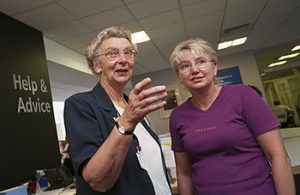WRVS: elderly care confusion ‘must end’
Older people are missing out on help needed after a hospital stay because of confusion about what services councils should provide, a charity says.
The WRVS wants local authorities to provide services that allow people to live independent lives when they get home after treatment.
It says there are huge inconsistencies in the services delivered by councils and health boards.
The Welsh government says it is working to support independent living.
The charity, which raises awareness about issues facing older people, has examined reablement services available across Wales – those services that help people with poor health live as independently as possible in their own homes.
Its report found that there were inconsistencies in the services delivered by local authorities and health boards, despite the Welsh government identifying it as a vital part of social services reform.
It also said that because there is no standard definition of “reablement”, there is confusion about which services it covers, resulting in the appearance that some local authorities spend more on it than others.
The charity has called on the Welsh government to develop a framework for Wales, outlining what exactly is meant by reablement and what features public bodies should provide.
Dr Ed Bridges, WRVS public affairs manager for Wales, said services should “focus on not just their physical well-being, but their social and emotional well-being as well”.
“The Welsh government is right to identify reablement as a vital part of social care in Wales but they now need to clear up any confusion about what services should be offered by public bodies,” he added.
Olive Brogan who receives care from the WRVS, said without visits from her carer Carol, she would be entirely alone.
“Carol comes once a week and she gives me an hour and sometimes she takes me shopping or into town, wherever I want to go. Without that I don’t know what I would do,” she said.
She added that it was hard for many people to understand her situation.
“They don’t realise – of course, you can’t expect people to realise what it’s like unless they have gone through it themselves, you know,” she said.
“You tell them and they sympathise with you but when it comes down to it they don’t really know.”
Care costs reduced
Ruth Crowder, policy officer for Wales for the College of Occupational Therapists and vice chair of the Welsh Reablement Alliance, said reablement services were effective in reducing care costs and enabled people to live at home longer.
She said members of the alliance, which include WRVS, MS society and Age Cymru, had found that different councils were offering different services.
She said: “It’s the way services have developed, how people recognise and include different things and different elements in reablement.
“So that we have some that are only programmes for people leaving hospital and some that are programmes for everybody that turns up, some that are only for people who have dementia, for example, or some specifically for other conditions.”
A Welsh government spokesperson said: “Our Social Services White Paper makes a commitment to introduce a requirement for reablement services to be provided across Wales and will ensure arrangements are in place for these to be planned and commissioned on a regional basis.”
